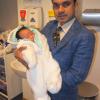Research carried out by Fox Chase Cancer Centre in Philadelphia suggests that women who have children particularly early in life have a lower lifetime risk of breast cancer when compared with women who do not.
The research identified a gene pattern found in breast tissue that differs between post-menopausal women who had children, and post-menopausal women who did not. The results will help scientists to understand why pregnancy reduces breast cancer risk and may assist towards developing strategies that can provide similar protection for women who did not have children.
The study compared breast tissue from 44 post-menopausal women who had children, and 21 post-menopausal women who did not. Ricardo Lopez de Cicco, a Senior Research Associate at Fox Chase comments, "When a woman has multiple pregnancies beginning at a relatively young age, we see a protective effect against breast cancer. That is very important because it could begin to help us to understand why women who have children early benefit from a reduced risk of breast cancer throughout their lives."



